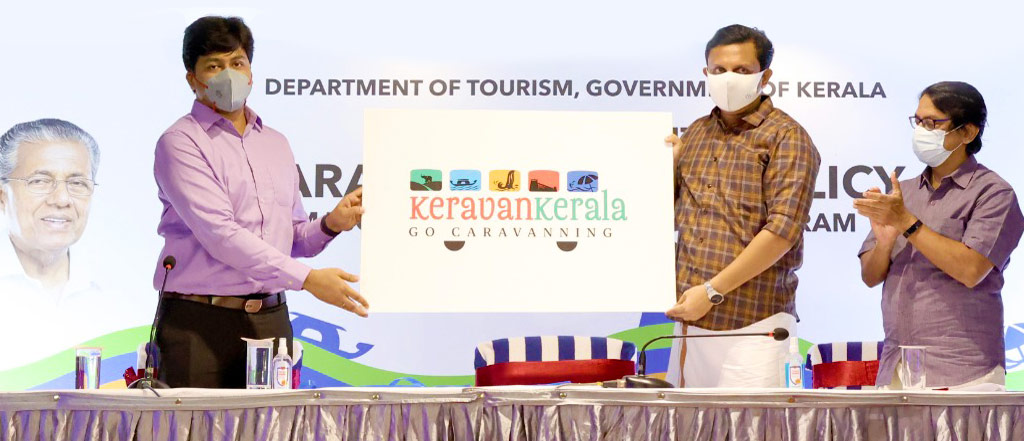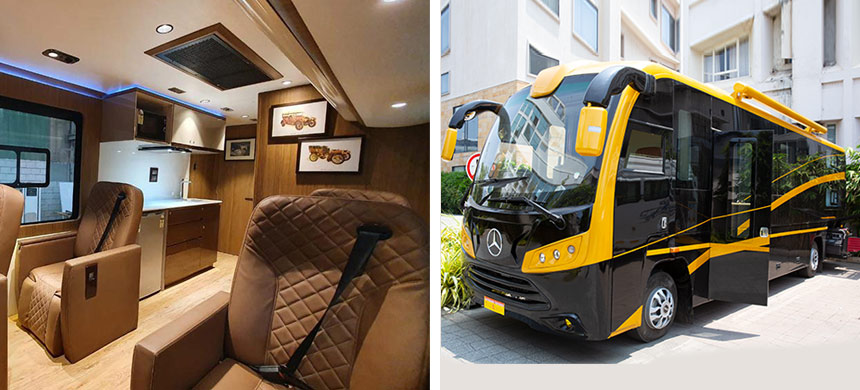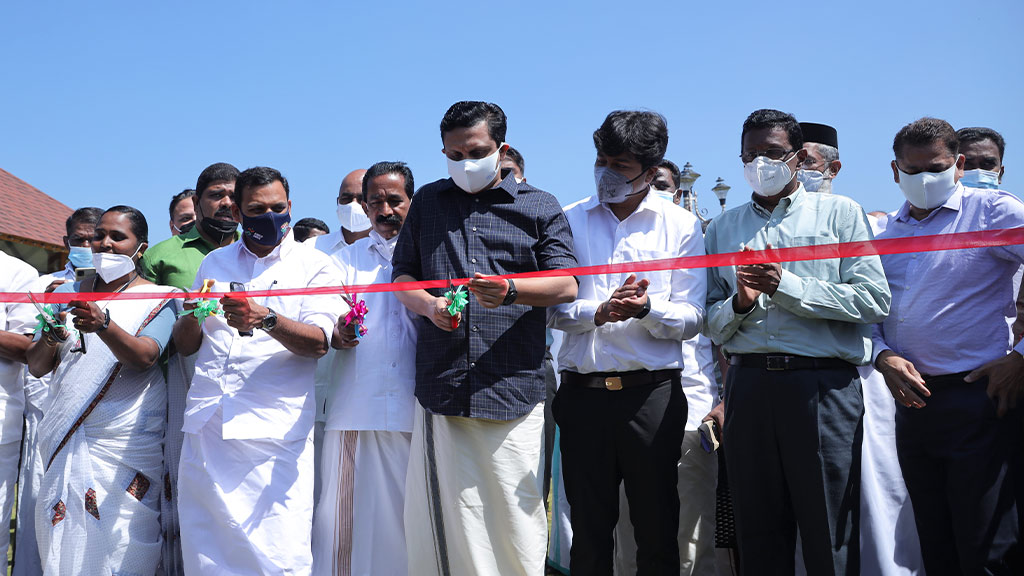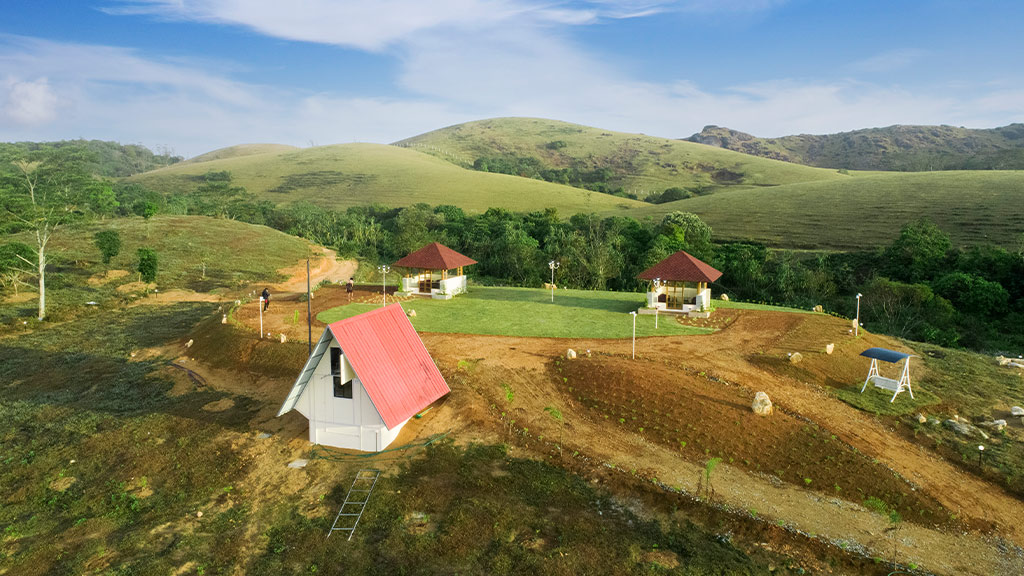Keravan Kerala

Shri P. A. Mohamed Riyas, Minister for Tourism, Government of Kerala, unveiling the logo of Caravan Tourism in Thiruvananthapuram along with Dr. Venu V. IAS, Additional Chief Secretary, Government of Kerala, and Shri V. R. Krishna Teja, Director, Tourism
Three decades after the State made it big with houseboat tourism, Department of Tourism, Government of Kerala, has unveiled a new tourism product - Keravan Kerala. The concept of Caravan Tourism, with its nonintrusive mode of development, will enhance the potential and attractiveness of Kerala as a tourism destination.
Driving a paradigm shift and rising to the demands and preferences of tourists in the post-pandemic world, Government of Kerala announced a comprehensive, stakeholder-friendly Caravan Tourism Policy, promising the visitors safe, customized and closest-to-nature travel experience.
It envisages laying down the broad frame work for the development and encouragement of Caravan Tourism in Kerala, predominantly in the private sector through incentivising the procurement of caravans and for establishing the caravan parks, chalking out process and procedures for its operations, approval mechanisms etc.
Caravan Tourism policy is unique for many reasons. For one, it facilitates travellers to embark on a once-in-a-lifetime-experience involving the luxury of caravans, the idyllic setting of caravan parks and Village Life Experience (VLE) packages powered by Kerala Responsible Tourism Mission. It aims at exploring the possibility of turning accessible but unexplored places in the state into alluring destinations for the caravan travellers to park and stay. The initiative is designed to make tourism a sustainable activity that would bring benefits to local communities and also scale up opportunities for the industry.
Keravan Kerala offers big opportunities for investors to operate specially-built caravans for travel, leisure and stay. It also envisages a key role for a host of stake-holders, including local self government institutions, to set up eco-friendly Caravan Parks across the state to enable the visitors to spend a night or a day or station for an extended period to explore the destination of their choice.
Download and read Government of Kerala's Caravan Tourism policy
Malayalam EnglishTourist Caravan

Tourist Caravans are vehicles specially built for the purpose of travel, leisure and accommodation. The customized stylish vehicles will be equipped with all the trappings for a smooth ride and comfortable stay. They include Rigid as well as Towed/Trailer Caravans. In Rigid Caravans, the propelling mechanism and accommodation facilities will be built as a single unit. However in Trailers, the accommodation facilities shall be a separate unit which will be towed by a suitable vehicle for transportation. The ideal length for the Caravan shall be about 8.5 m.
A Tourist Caravan would include vehicles with the following minimum features:
- Sofa-cum-bed for a minimum of two persons
- Kitchenette with fridge and microwave oven
- Partition behind driver
- Communication between the passenger and the driver
- Air-conditioning
- Dining Table
- Audio / Video Facility
- Net Connectivity
- Complete charging system – external and internal
- GPS (desirable). Caravan would enable themselves with the GPS facility as and when it becomes available
- Preferably Bharat Stage VI compliant
- Eco-friendly waste-treatment mechanism
- IT-enabled real-time monitoring system for the caravan
Caravan Parks

Caravan Parks will be located in natural settings, giving top priority to tourists' safety and security and hygienic features. These parks will be a completely safe and secure zone offering hassle-free and stress-free environment to tourists, protected with necessary features like proper fencing, adequate security and safety arrangements, patrolling and surveillance cameras. Caravan Parks will be developed in the Private Sector, Public Sector or in the Joint Sector, as the case may be, the configuration of which varies from location to location, even though the fundamental attributes remain the same. The general focus of the development of Caravan Parks shall be for utilising the tourism potential of the new and untapped destinations.
Download and read Government of Kerala's Caravan Tourism policy
Malayalam EnglishOperational Requirements
- Be operational 24 x 7 during the tourist season or on demand
- Be connected by fair-weather road from the main road
- Have all necessary trading licenses / NOCs from the authorities concerned including fire , pollution etc
- Have public liability insurance
- Have electricity, water and sewage connections compatible with the Caravan specifications in India to ensure standardisation
- The parks could be standalone or hybrid. However, in the case of hybrid parks, the caravan parking facilities and related services should be physically separated and be away from the other services like the wayside amenities, restaurants, general vehicle parking or accommodation
Types of Caravan Parks

Depending upon the facilities provided and the mode of operation, Caravan Parks of various kinds can be operated as given below.
 State-of-the-art Caravan Parks
State-of-the-art Caravan Parks
- Intended for the overnight and for the extended periods of stay
- Full-fledged facilities such as reception, kitchen, dormitory, electricity, septage connection, toilets and bathrooms, etc
 Day Parks
Day Parks
- Intended for one day tours/visitors not intending to stay overnight
- Only minimal facilities such as toilet facilities, kitchen and cafe
 Hybrid Caravan Park
Hybrid Caravan Park
- Caravan parks set up as part of a resort having accommodation facilities
 Caravan Parks as a part of Independent houses
Caravan Parks as a part of Independent houses
- Independent House Owners having necessary land area for operating Caravan Parks which can accommodate one or two caravans at a time
- Shall be easily accessible by road and in the vicinity of tourism attractions
- Kerala Responsible Tourism Mission to take a lead role in the identification of suitable properties through an appropriate registration process
 Caravan Parks in Plantation
Caravan Parks in Plantation
- As per the G.O (P) No.476/2015/RD dated 22nd September 2015, the tourism projects include Caravan Park also
 Caravan Parks under KTDC
Caravan Parks under KTDC
- KTDC /Department of Tourism can set up Caravan Parks in the land parcels having tourism potential at various locations
- The facilities can be operated as units under the Responsible Tourism or at suitable places, it can be operated with minimum facilities from KTDC
 Caravan Parks by LSG Institutions / other Departments
Caravan Parks by LSG Institutions / other Departments
- LSG institutions or Departments such as Forest & Wildlife etc having unutilised land parcels adjacent to places of tourism potential can establish & promote Caravan Parks as a non-intrusive development option to provide employment opportunities & economic benefits to the local community
 Safety & security
Safety & security
- A boundary wall with limited entry and lockable gates around the Caravan Park area to avoid trespassing. Adequate security and safety arrangements should be made which shall include deployment of security guards with a system of patrolling and surveillance cameras.
- A properly equipped First Aid kit should be available at the reception and adequate first aid training should be provided to the staff. The facility of doctor on call should be available at the park and a well defined mechanism shall be in place to handle any medical emergency. The park management shall maintain effective coordination with the local medical establishments.
- The supervisory staff and other workers should be trained in the Disaster Management to face disasters like the fire, road accidents, earthquakes, floods, landslides (in hills) etc.
Tourist Facilitation centre (TFC)
The TFC shall be constructed providing appropriate facilities and infrastructure for the tourists /campers. The architecture of the new/ upcoming buildings in the hilly and ecologically fragile areas shall incorporate creative architecture for its sustainability, for its energy efficiency and as far as possible in conformity with the local art and the architecture using the local materials.
Responsible Tourism
Responsible Tourism-friendly policy shall be adopted for sustainable growth which also benefits the local community and does not adversely affect the local environment. Use of eco-friendly practices and local products shall be encouraged.
Waste Management
- Provision for the segregation of the garbage into biodegradable (kitchen waste etc), non- bio-degradable (thermo coal products, aluminium foil, cigarette buts etc) & recyclable (newspapers, bottles, cans etc) material.
- System for the reception, storage and disposal of all the refuse and waste matter originating from the park.
- Adequate and safe method of sewerage collection, treatment and disposal.
